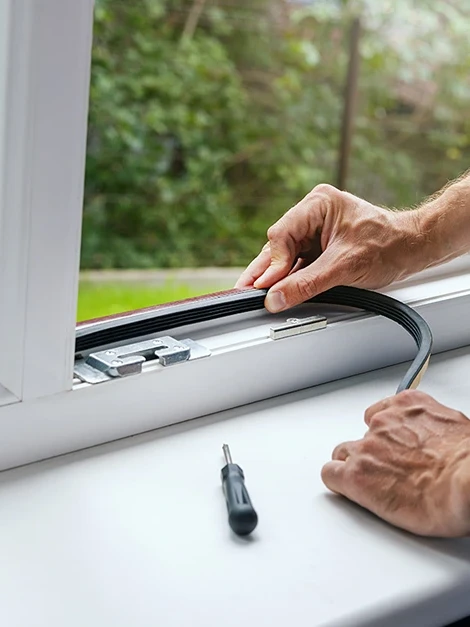Double glazing in your house may help you save money on heating bills. You can get windows installed at your property that will help you with heat loss. While single-glazed window designs don’t offer much insulation, the contrary is true for double glazing. The heat can seep through the thin structure of single glazed windows, and chilly air can enter quickly inside your property. Consequently, your energy bill can increase dramatically, and your property may feel cold, humid, and eventually uncomfortable.Double glazed windows can make a massive difference, and it’s highly recommended to invest in them. Because they offer so many benefits, let’s go through the essential details and see how double glazing reduces heat loss.
Considering replacement windows?
The Mechanics Behind Double Glazing
To understand how these windows limit heat, it’s essential to consider how they are built. Double-glazed windows are made out of two glass panes separated by Argon gas. This specific gas is a poor thermal conductor. As a result, the heat does not pass through the second glass pane and into the other side of the window. The same thing occurs with sound: it dissipates rapidly without complete transmission to another room.Double-glazed windows can save up to 64% of the heat loss compared to conventional single-pane ones. This means lowering heating costs in the longer term. Now that we’ve discussed all of the technicalities involved in reducing heat loss, it’s time to talk about how they work.Last but not least, it’s important to note that, with time condensation will appear on your double glazing. While this could be an indicator that you should replace your windows, it’s best to check with an expert.
The Reflective E-coating Inside the Double Glazing
The reflective e-coating on the glass panes plays a role in minimising heat loss through the windows. Each glass has an inner reflecting layer that reflects the temperature to where it originated, further reducing heat loss. This maintains the internal temperature unaffected by changes in the outside environment due to the additional barrier that poorly conducts heat.
Controlling the Temperature
Reducing heat loss means controlling temperatures inside your home, which is the main benefit to double glazing.They help maintain a consistent temperature inside by eliminating heat loss from both sides. Single-pane windows maintain a constant temperature for cold and warm areas without relying on a heating system.
The Space Between the Window’s Panes
A spacer separates the two glass layers. It is generally made of fibre, metal, or aluminium and is used to reduce humidity. This is the secret to keeping your home cool in summer and warm in winter. The distance between the two glass layers is known as a spacer. It varies from 6 to 20 mm, and the bigger it is, the higher the protection will be.In the case when your main priority is to minimise heat loss, it is recommended to select 24mm for the best insulation. The glass’s thickness does vary, and it has nothing to do with the spacer.
Does Double Glazing Decrease UV?
When you use glass that deflects UV rays, it’s as if you’ve applied sunscreen to your windows. Your furniture will no longer fade due to sun damage caused by UV, and your skin will benefit from it should you sit long hours in front of your window. The most significant benefits are realised with laminated glass. It reduces the UV light penetration by 95%. Tinted glasses also allow you to lower UV light penetration.
Double Glazing Uses Direct Sunlight to Heat Your Property
Other than reducing heat loss, a great benefit of double glazing is that it uses direct sunlight to increase the temperature in a property.In fact, the heat is absorbed by the glasses and is then transferred inside your home by radiation. But let’s dive deeper into the subject to understand how the system functions.
The Glass Orientation
The amount of solar energy gain your windows offer throughout the year is dependent on their orientation. During summer, south-facing windows will experience peak absorption, while east and west-facing windows will still experience absorption in the mornings and afternoons, respectively.
The Shadows Play a Role
Heat gain can be higher if there isn’t enough shading on a window, especially in the summertime when the temperatures are at their highest. It’s simple to get adequate shade levels for windows facing south; however, protecting east and west-facing glass panes might be intricate because the sun shines at a lower angle.
The G-Value is Often Underestimated
The U-value of a window is known to be an indicator of heat loss protection. However, the G-value should also be counted.This value measures how much heat and light enter a house. The lower the G-value, the better. You can use solar control or low-emissivity glazing to stop UV rays from passing into your house and inside your furniture.
The Long-term Benefits of Double-Glazed Windows in a Property
Double glazing should be regarded as a long-term investment. Installing double-glazed windows may be more expensive at first, but you can make savings on insulations throughout their lifespan. They also contribute to the value of your property by improving its energy efficiency rating and adding to its aesthetic appeal.
Conclusion
These were all the details regarding the reduction of heat loss and all the mechanisms behind it. As you probably understood, double glazing is complicated to build, but the cost of installing new windows is undoubtedly worth it, given the long-term benefits. Adding double glazing windows to your home is a great way to improve the look and feel of your property. These types of windows come in a variety of frame styles and colours. They are a great way to prevent condensation, potentially damaging your property. Because double glazed glass has a layer of trapped air, this moisture is not allowed to reach the outer pane of glass, which reduces the risk of condensation. While the initial investment may be frightening, it’s worth considering the long-term benefits of new double glazing in your house. If you’re willing to improve your home’s energy efficiency and save money on your heating and cooling costs every year, double glazed windows and doors are an obvious choice.










